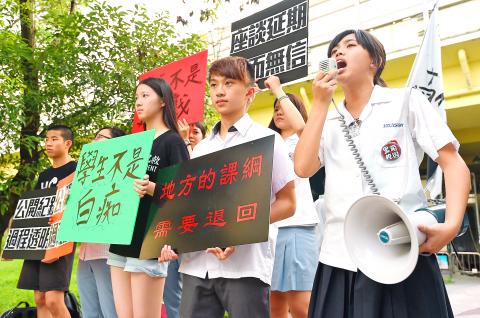Deputy Legislative Speaker Hung Hsiu-chu (洪秀柱) yesterday weighed in on controversy over the Ministry of Education’s high-school curriculum adjustments, saying the changes were “too minor” and “far from enough.”
The Chinese Nationalist Party (KMT) presidential hopeful said in an interview with radio host Tang Hsiang-lung (唐湘龍) yesterday morning — who called the curriculum controversy “the most bloody, political and vicious machination” — that it is “wrong to call the adjustment process a ‘black box.’”
Defending the ministry against a court ruling that its conduct in planning and deciding the adjustment process was not transparent enough, Hung said that it was the composition of the curriculum adjustment committee, rather than the adjustments per se, that was admonished by the court.

Photo: Liao Chen-huei, Taipei Times
However, “consider this: If [the ministry] did make public the names of the members of the curriculum adjustment committee, given the prevailing political mood, no one would dare join the committee in the future,” she said.
“Even those who are rational and hard-working would not dare to do so, because they will be harshly criticized, humiliated or even harassed at their residence. How can the ministry make the list public?” she said.
Hung claimed that if the ministry had asked a group of academics who have a different political leaning, such as those who favor Taiwanese independence, to sit on the committee, “there definitely would have been no problem at all,” because KMT supporters would not harass those academics or make a scene “thanks to a different political culture.”
As for the curriculum adjustments, Hung said they were “way too minor” and “far from enough.”
“Almost nothing has been changed,” she added.
The curriculum guidelines have to be revised in accordance with the Constitution of the Republic of China, Hung said, adding that the ministry had already been “compelled” to make concessions, such as allowing teachers to prepare their own additional teaching materials and promising that controversial parts would not be tested.
“History as a subject underwent a 180o change during the administrations of [former] presidents Lee Teng-hui (李登輝) and Chen Shui-bian (陳水扁),” she said. “Were the names of curriculum committee members made public then?”
“We are simply returning [the curriculum] back to the right track — a track that is in accordance with the ROC Constitution,” she added.
Tang said he was “deeply concerned,” as the “Sunflower movement generation” who have been taught these revisions, now have a “distorted, self-rationalized and relatively self-isolated view of history.”
“Yes,” Hung said repeatedly, expressing enthusiastic approval of Tang’s remarks.

NATIONAL SECURITY THREAT: An official said that Guan Guan’s comments had gone beyond the threshold of free speech, as she advocated for the destruction of the ROC China-born media influencer Guan Guan’s (關關) residency permit has been revoked for repeatedly posting pro-China content that threatens national security, the National Immigration Agency said yesterday. Guan Guan has said many controversial things in her videos posted to Douyin (抖音), including “the red flag will soon be painted all over Taiwan” and “Taiwan is an inseparable part of China,” while expressing hope for expedited “reunification.” The agency received multiple reports alleging that Guan Guan had advocated for armed reunification last year. After investigating, the agency last month issued a notice requiring her to appear and account for her actions. Guan Guan appeared as required,

A Vietnamese migrant worker yesterday won NT$12 million (US$379,627) on a Lunar New Year scratch card in Kaohsiung as part of Taiwan Lottery Co’s (台灣彩券) “NT$12 Million Grand Fortune” (1200萬大吉利) game. The man was the first top-prize winner of the new game launched on Jan. 6 to mark the Lunar New Year. Three Vietnamese migrant workers visited a Taiwan Lottery shop on Xinyue Street in Kaohsiung’s Gangshan District (崗山), a store representative said. The player bought multiple tickets and, after winning nothing, held the final lottery ticket in one hand and rubbed the store’s statue of the Maitreya Buddha’s belly with the other,

‘NATO-PLUS’: ‘Our strategic partners in the Indo-Pacific are facing increasing aggression by the Chinese Communist Party,’ US Representative Rob Wittman said The US House of Representatives on Monday released its version of the Consolidated Appropriations Act, which includes US$1.15 billion to support security cooperation with Taiwan. The omnibus act, covering US$1.2 trillion of spending, allocates US$1 billion for the Taiwan Security Cooperation Initiative, as well as US$150 million for the replacement of defense articles and reimbursement of defense services provided to Taiwan. The fund allocations were based on the US National Defense Authorization Act for fiscal 2026 that was passed by the US Congress last month and authorized up to US$1 billion to the US Defense Security Cooperation Agency in support of the

CLASSIFIED BRIEFING: The ministry said the special budget focuses on building a comprehensive defense system and strengthening the domestic defense industry The Ministry of National Defense yesterday released information on seven categories of weapons systems to be procured under a stalled NT$1.25 trillion (US$39.57 billion) special defense budget, including precision artillery, long-range missiles, air defense anti-tank missiles and more than 200,000 uncrewed aerial vehicles (UAVs). The Executive Yuan approved a draft version of the budget on Nov. 27 last year and submitted it to the legislature for review. The legislature’s Foreign Affairs and National Defense Committee yesterday invited Minister of National Defense Wellington Koo (顧立雄) to deliver a classified briefing and answer questions at a closed-door session. Koo said he hoped to provide lawmakers